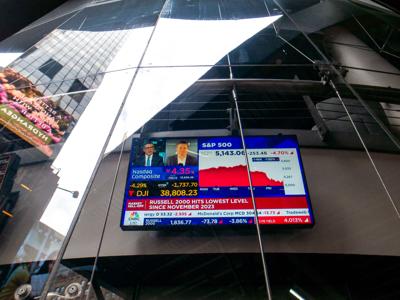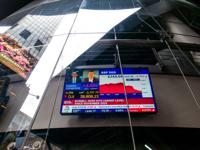Stock markets slid again Friday as China matched new U.S. tariffs, deepening the trade war President Donald Trump kicked off this week and signaling more global economic turmoil ahead.
Beijing announced an additional 34 percent tariff on U.S. goods, the same rate Trump had imposed on Chinese imports Wednesday - a move that Chinese officials called “inconsistent with international trade rules.”
The development brought more pain on Wall Street, where major indexes have all dropped more than 9 percent since Trump unveiled the sweeping tariffs Wednesday. On Friday, the S&P 500 closed down nearly 6 percent and the Dow Jones Industrial Average shed 5.5 percent. The tech-heavy Nasdaq was off 5.8 percent - firmly in bear market territory, or down more than 20 percent from its recent peak.
‘Recession in economic activity’
The swirl of events led analysts at JPMorgan to increase their estimated odds of a recession to 60 percent, up significantly from previous projections. In a note Friday, researchers also wrote that “the recession in economic activity” was expected to push the unemployment rate up to 5.3 percent.
U.S. trading partners have been alarmed - and stocks have sunk worldwide - since Trump announced a 10 percent tax on most imported goods and an additional punitive import tax tailored individually for about 60 countries.
Those aggressive policies will probably slow growth and send prices up, Federal Reserve Chair Jerome H. Powell said Friday. It will still take time to fully assess how the administration’s policies - on trade, immigration, taxes and more - will shake out. But Powell said that “the tariff increases will be significantly larger than expected,” probably putting any interest rate cuts on hold for some time. (The Fed strives to stay out of politics but is in charge of keeping inflation in check.)
The response from China showed a full-blown trade war is already underway, even before many U.S. allies have announced countermeasures to Trump’s move.
A statement from China’s State Council condemned “unilateral bullying” by the United States that it said had “seriously damaged China’s legitimate rights and interests.” The new duties arrived with nontariff measures as well, reflecting Beijing’s playbook of using pressure points that amount to what it considers a tit-for-tat response.
Though it did buy nearly $144 billion in U.S. goods last year, China exports far more than that to the United States, leaving Beijing unable to match Trump’s tariffs dollar for dollar.
China announces export controls
Still, China has made clear that it can use other tools to make up the difference. On Friday, officials announced export controls on rare earth metals needed to make high-tech products, the suspension of export licenses for 16 U.S. firms and the adding of 11 companies to an “unreliable entities list.”
Beijing also launched an anti-monopoly investigation targeting the U.S. chemical giant DuPont, as well as an antidumping investigation into a type of medical X-ray tube imported from the United States and India.
Unlike in Trump’s first term, China has taken a more proactive approach to his trade maneuvers this time around, where “every U.S. action garners a swift and substantive reaction,” said Joe Mazur, a senior analyst at Trivium China, a consultancy.
Beijing tries “not to strike first but always strikes back,” Mazur said.
Tech companies that are closely linked to global markets suffered sell-offs Friday. Nvidia, the AI chipmaker, closed down more than 7 percent. Apple fell more than 7 percent, and Tesla slid 10 percent.
Smaller companies were also hit hard, with the Russell 2000 index of small-capitalization stocks off more than 18 percent for the year. Small companies are thought to be more vulnerable to the effect of tariffs because they don’t have the scale to absorb price increases, said investment analyst Michael Farr. “They also don’t have any power to push price concessions from their suppliers,” Farr added.
The Cboe volatility index, known as Wall Street’s “fear gauge,” spiked 45 percent Friday and is up 144 percent since the start of the year. The 10-year Treasury yield fell as investors fled to bonds for safety.
Price of crude oil falls
Crude oil fell more than 6 percent to roughly $62 per barrel as commodities markets reacted to the possibility of slower economic growth. “To state the obvious, the highest U.S. tariffs in more than 100 years, plus retaliation, will have the effect of slowing the economy around the world, and that is fundamentally a headwind for oil demand,” said Raymond James analyst Pavel Molchanov.
Analysts said the escalation by China hurts the chances of negotiations between Washington and Beijing.
“The two sides are likely not done hitting each other,” said Scott Kennedy, a China expert at the Center for Strategic and International Studies. “Given the U.S.’s threat to punish those who retaliate, we can anticipate that the U.S. may double its tariffs on China (to the full 67 percent level), in which case China would as well.”
Chinese experts had warned that Beijing would not back down.
“Trump’s policy is to scare people first. If you are afraid, you will beg for mercy,” said Wang Yiwei, director of the Institute of International Affairs at Renmin University in Beijing. “… From China’s perspective, this is blackmail, and China is different from America’s allies. It is relatively independent and will not be fooled by America.”
Reactions vary
Other regional leaders seized on Trump’s suggestion that he might be open to cutting deals, despite his previous insistence that he was not interested in discussing exemptions to his tariffs.
Japanese Prime Minister Shigeru Ishiba said Friday that the tariffs amounted to a “national crisis” and called on ministers to “closely study” them and take measures to lessen their impact on the country’s economy.
In Singapore, Deputy Prime Minister Gan Kim Yong said the country, which will pay only the baseline 10 percent Trump imposed everywhere, was not yet retaliating.
Taiwanese President Lai Ching-te said he was looking forward to “working closely with the U.S. to ensure a fair, mutually beneficial approach that strengthens our shared prosperity.”
Australia’s ASX 200 closed 2.4 percent lower Friday, and South Korea’s KOSPI fell nearly 1 percent, although this was also because of upheaval over the president’s removal from office. Trading in China and Hong Kong was closed Friday for the Tomb-Sweeping Day holiday.
On a day he branded “Liberation Day,” Trump announced tariffs on imports from almost every country.
These included a new tariff of 34 percent on Chinese goods, on top of the 20 percent levy imposed in February as Trump accused Beijing of not doing enough to stop the flow of fentanyl and its precursors into the United States. It is also in addition to existing levies on goods such as appliances, machinery and clothing that were already as high as 45 percent after Trump’s first round of tariffs.
Trump also slapped duties of 24 percent and 25 percent on Japan and South Korea, respectively - both key U.S. security allies - and 32 percent on Taiwan, although he exempted its advanced semiconductors.
And Trump targeted many of the countries that had benefited from companies’ efforts to diversify supply chains away from China: Cambodia was stung with a 49 percent tariff, Vietnam with 46 percent, and Thailand, 36 percent.
American businessman Michael Laskau said that if the proposed tariffs are imposed, the impact on his garment business in Vietnam will be dramatic. “No one works on those types of margins,” he said. “If we were to assume the 46 percent, for us, it would be a huge, huge loss, as it would be for anybody in the supply chain.”
Despite repeatedly ruling out negotiations, Trump told reporters Thursday that he would be open to striking deals with individual countries.
“Every country is calling us. That’s the beauty of what we do,” Trump told reporters on Air Force One. “We put ourselves in the driver’s seat. If we would have asked these countries to do us a favor, they would have said no. Now they will do anything for us.”


